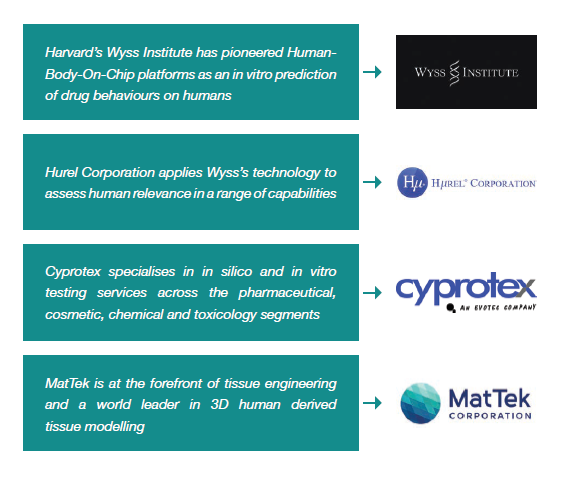Chapter 8 Growing Demand for Alternatives
This Insight has focused on several areas where animals are strongly impacted – in food, testing and the use of animal derived products such as leather and wool. Given acute recognition of some of the welfare implications, there is growing interest in alternatives to remove suffering and ill-treatment.
The vegan phenomenon is perhaps just the most obvious, but here we consider a few alternatives to the use of leather and wool, to animal testing, to the use of animal parts in TCM, and in entertainment from increasing the use of technology. A public focus on respect and dignity and the avoidance of animal exploitation is driving innovation. Some practices still demand the use of animals, e.g. clinical trials but even this is changing! Here we look at just some of them.
Alternatives: Peak meat? Perhaps the most vocal debate in recent times has been the growth in veganism, with around 1% of the UK population adopting vegan diets and lifestyles. The drivers are both environmental and lifestyle – the climate and ecological impact of rearing animals for meat, and the potential health benefits of plant-based diets in lower cholesterol levels and the risk of developing diabetes.
Whilst specialist companies are synonymous with veganism, it is now becoming a mainstream option with the major food retailers and hospitality outlets such as Whitbread and Mitchells & Butlers offering vegan menus. The global vegetarian market is conservatively put at $50bn, with vegan options a further $19bn and growing fast. Vegan cosmetics that remove or avoid all animal derived products, such as lanolin, are also gaining traction, with sales of over $15bn. Beyond Meat Inc. is perhaps the best known and longest established plant-based meat company, originating the ‘Beyond Burger’ brand but now selling a range of plant-based meat alternatives to beef, pork and poultry.
Beyond Meat takes the five building blocks of meat – protein, fat, minerals, carbohydrates and water – directly from plants. Proteins include pea, mung bean, fava bean and rice; fats are taken from cocoa butter, coconut oil, sunflower oil and canola; minerals from calcium, iron, salt and potassium; colouring from beetroot and carbs from potato starch.
Alternatives: Beyond Animal Testing
There are substantial alternatives to animal testing across the spectrum – however not all of these technologies are investible – but all are interesting

Alternatives to Wool
For vegans wishing to avoid all animal derived products, alternatives to wool have largely consisted of synthetic man-made fibres. EdenTree’s holding in Mohawk takes a problem waste product – PET single-use plastic bottles and re-engineers them into high-end floor coverings. Mohawk is now one of the largest recyclers of PET bottles in the US taking more than 5.5bn plastic bottles out of the waste chain annually. Whilst most carpets can still contain up to 20% pure wool, Mohawk removes the need for wool completely via the use of an abundant waste feedstock. A more sustainable solution than using virgin PET, nylon or acrylic.